To prevent weeds from growing beneath your deck, you should apply a ground covering of landscape fabric, followed by 34 inches of gravel.  Boiling Water.
Boiling Water. 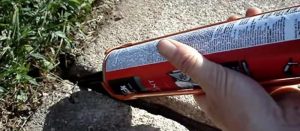 You can mix vinegar with water and pour it on the weeds. Does table salt kill weeds permanently? You could kill the weeds at their roots; however, you could keep the soil and their dormant seeds as it is. Then take the mixture in a sprayer.
You can mix vinegar with water and pour it on the weeds. Does table salt kill weeds permanently? You could kill the weeds at their roots; however, you could keep the soil and their dormant seeds as it is. Then take the mixture in a sprayer. 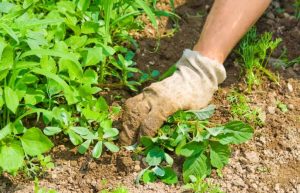 Apply white vinegar to weeds. The Glyphosate in Roundup works by infiltrating the plant through the leaves. Does salt stop weeds from growing? Hand-pull weeds or use a strong herbicide to stop weed growth permanently. The weeds themselves cannot deal with the intense heat and so begin to die. The heavy black plastic you may have seen in the past is not ideal. Fill with warm water and stir. Rinse well with clean water. Distilled, white, and malt vinegar all work well to stop weed growth. Pour the vinegar into an empty spray bottle and spray the cracks between the pavers, leaving it to sit and work its way into the sand.
Apply white vinegar to weeds. The Glyphosate in Roundup works by infiltrating the plant through the leaves. Does salt stop weeds from growing? Hand-pull weeds or use a strong herbicide to stop weed growth permanently. The weeds themselves cannot deal with the intense heat and so begin to die. The heavy black plastic you may have seen in the past is not ideal. Fill with warm water and stir. Rinse well with clean water. Distilled, white, and malt vinegar all work well to stop weed growth. Pour the vinegar into an empty spray bottle and spray the cracks between the pavers, leaving it to sit and work its way into the sand.  If the area is relatively small and your back and knees can cope, pulling out the short rooted Using Plastic To Control Grass. Pull the weeds out of the ground before they turn brown. It decomposes quickly and corners start to stick up through the rock. Following the correct mowing height can prevent these weeds from germinating and establishing in home lawns. This will block the sunlight from the weeds and will stop them from growing. It is recommendable to spray the mixture on a sunny day as the high temperatures will aid in the desiccation effect of vinegar. A DIY Guide.Thanks for watching!
If the area is relatively small and your back and knees can cope, pulling out the short rooted Using Plastic To Control Grass. Pull the weeds out of the ground before they turn brown. It decomposes quickly and corners start to stick up through the rock. Following the correct mowing height can prevent these weeds from germinating and establishing in home lawns. This will block the sunlight from the weeds and will stop them from growing. It is recommendable to spray the mixture on a sunny day as the high temperatures will aid in the desiccation effect of vinegar. A DIY Guide.Thanks for watching!  Table Salt - Using salt to kill weeds is a common do-it-yourself solution. What kills weeds permanently? However, this does not prevent weeds from returning in your lawn if seeds are present in the soil. https://wemowdallas.com/how-to-stop-grass-and-weeds-from-growing
Table Salt - Using salt to kill weeds is a common do-it-yourself solution. What kills weeds permanently? However, this does not prevent weeds from returning in your lawn if seeds are present in the soil. https://wemowdallas.com/how-to-stop-grass-and-weeds-from-growing  Mulch, mulch, mulch. Citrus oil serves many purposes, including as an odorizing agent. If you are trying to grow plants or grasses, run water around the area to flush the bleach.
Mulch, mulch, mulch. Citrus oil serves many purposes, including as an odorizing agent. If you are trying to grow plants or grasses, run water around the area to flush the bleach. 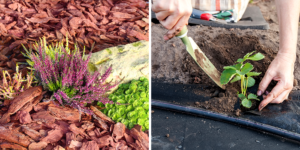 Next, install a steel edging border that is at least 3 inches high (4 is better). Kill the Weeds and Grow the Grass. Roundup is safe to use on all types of plants, including grasses, trees, shrubs, flowers, vegetables, and fruit.
Next, install a steel edging border that is at least 3 inches high (4 is better). Kill the Weeds and Grow the Grass. Roundup is safe to use on all types of plants, including grasses, trees, shrubs, flowers, vegetables, and fruit. 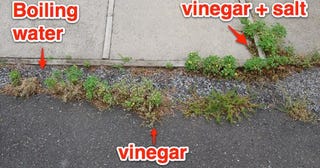 From there, it attacks all plant systems and kills them completely, including the roots. Finally, spray it on weeds. Weeds are just so stubborn they will grow even through rock, driveway, sidewalks, pavers, gravel, and mulch. Boiling Water.
From there, it attacks all plant systems and kills them completely, including the roots. Finally, spray it on weeds. Weeds are just so stubborn they will grow even through rock, driveway, sidewalks, pavers, gravel, and mulch. Boiling Water.  You can also use a herbicide made from natural ingredients. how to get rid of weeds in grass naturallyinstead of complaining about life quotesinstead of complaining about life quotes [6] You can poke holes in the vinegar cap for a handy way to distribute the "weed killer."
You can also use a herbicide made from natural ingredients. how to get rid of weeds in grass naturallyinstead of complaining about life quotesinstead of complaining about life quotes [6] You can poke holes in the vinegar cap for a handy way to distribute the "weed killer."  This strategy usually works best with a transparent tarp cover made from polyethylene, rather than white or black plastic. What kills weeds permanently?
This strategy usually works best with a transparent tarp cover made from polyethylene, rather than white or black plastic. What kills weeds permanently?  Yes, vinegar does kill weeds permanently and is a viable alternative to synthetic chemicals. Pour boiling water directly on the plant to kill the weed and its roots. How do you permanently stop weeds from growing?
Yes, vinegar does kill weeds permanently and is a viable alternative to synthetic chemicals. Pour boiling water directly on the plant to kill the weed and its roots. How do you permanently stop weeds from growing?  Use salt to control weeds in driveways, walkways, patios, pavements, gravel, and rocky areas. Using a thick rubber sheet beneath the fence is one of the most effective methods of keeping weeds away from fences. A good compost pile can get hot enough (160F) to kill weed seeds. To kill existing weeds and prevent their return without investing in a ground covering, use long-term weed killers, natural weed killers, and pre-emergent weed preventers.
Use salt to control weeds in driveways, walkways, patios, pavements, gravel, and rocky areas. Using a thick rubber sheet beneath the fence is one of the most effective methods of keeping weeds away from fences. A good compost pile can get hot enough (160F) to kill weed seeds. To kill existing weeds and prevent their return without investing in a ground covering, use long-term weed killers, natural weed killers, and pre-emergent weed preventers. :no_upscale()/cdn.vox-cdn.com/uploads/chorus_asset/file/19504306/16_lawn_weeds.jpg) The sheets will prevent the weeds from sprouting to the surface. It's quite impressive, actually. Removing a weed by the roots prevents it from growing back. Make sure you pull the heads off weeds before they have a chance to go to seed and spread around the garden. Regular white vinegar has a concentration of 5% acid, and pickling vinegar has a 7% concentration. What kills weeds permanently? Mulch, mulch, mulch. A short video showing how to remove and restore your interlocking patio to as good as new. Sometimes mulches such as straw and wood chips contain weed seeds. As vines grow, you can How to Use Vinegar To Kill Weeds To make your own vinegar herbicide, you just need two cups of vinegar and 1/2 tablespoon of dish detergent. 4) Use weed killer. What you will need: Weed Suppressant sheets. Another natural way of killing weeds is to douse them with boiling water.
The sheets will prevent the weeds from sprouting to the surface. It's quite impressive, actually. Removing a weed by the roots prevents it from growing back. Make sure you pull the heads off weeds before they have a chance to go to seed and spread around the garden. Regular white vinegar has a concentration of 5% acid, and pickling vinegar has a 7% concentration. What kills weeds permanently? Mulch, mulch, mulch. A short video showing how to remove and restore your interlocking patio to as good as new. Sometimes mulches such as straw and wood chips contain weed seeds. As vines grow, you can How to Use Vinegar To Kill Weeds To make your own vinegar herbicide, you just need two cups of vinegar and 1/2 tablespoon of dish detergent. 4) Use weed killer. What you will need: Weed Suppressant sheets. Another natural way of killing weeds is to douse them with boiling water.  Applying too much salt on weeds will kill them permanently due to sodium chloride toxicity. Use salt to control weeds in driveways, walkways, patios, pavements, gravel, and rocky areas. Some weed seeds can quite effectively germinate on top of bare soil, while others need a bit more help and soil coverage to sprout. The good news is, killing weeds in rocks is not much different from killing weeds in the garden and lawn. What kills weeds permanently? It attacks all plant systems and kills them all, leaving no trace in the soil or water. Vinegar is a natural herbicide that can be used to stop weed growth. Distilled, white, and malt vinegar all work well to stop weed growth.
Applying too much salt on weeds will kill them permanently due to sodium chloride toxicity. Use salt to control weeds in driveways, walkways, patios, pavements, gravel, and rocky areas. Some weed seeds can quite effectively germinate on top of bare soil, while others need a bit more help and soil coverage to sprout. The good news is, killing weeds in rocks is not much different from killing weeds in the garden and lawn. What kills weeds permanently? It attacks all plant systems and kills them all, leaving no trace in the soil or water. Vinegar is a natural herbicide that can be used to stop weed growth. Distilled, white, and malt vinegar all work well to stop weed growth.  Add a cup of table salt to help dry out the weeds root system. Does sodium hydroxide kill weeds? It is a common item in every kitchen. Instead of treating weeds with harsh chemicals, open the pantry and reach for the white vinegar. The heat and vinegar will sink down to the root and kill the grass at its core. Glyphosate works by entering the plant through the leaves. Vinegar contains acetic acid, which kills vegetation. Yes, vinegar does kill weeds permanently and is a viable alternative to synthetic chemicals. The Glyphosate in Roundup works by infiltrating the plant through the leaves. How to permanently stop weeds from growing. Weeding gravel by hand. Score: 4.5/5 (28 votes) . Only a teaspoon of baking soda is necessary for each plant you want to eliminate. https://www.craftylittlegnome.com/permanently-kill-grass-weeds Apply an herbicide. Yes, vinegar does kill weeds permanently and is a viable alternative to synthetic chemicals.
Add a cup of table salt to help dry out the weeds root system. Does sodium hydroxide kill weeds? It is a common item in every kitchen. Instead of treating weeds with harsh chemicals, open the pantry and reach for the white vinegar. The heat and vinegar will sink down to the root and kill the grass at its core. Glyphosate works by entering the plant through the leaves. Vinegar contains acetic acid, which kills vegetation. Yes, vinegar does kill weeds permanently and is a viable alternative to synthetic chemicals. The Glyphosate in Roundup works by infiltrating the plant through the leaves. How to permanently stop weeds from growing. Weeding gravel by hand. Score: 4.5/5 (28 votes) . Only a teaspoon of baking soda is necessary for each plant you want to eliminate. https://www.craftylittlegnome.com/permanently-kill-grass-weeds Apply an herbicide. Yes, vinegar does kill weeds permanently and is a viable alternative to synthetic chemicals. 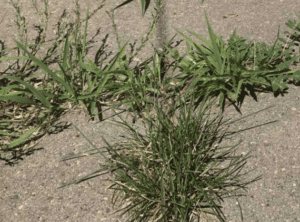 Pull the weeds out of the ground before they turn brown. If you want to kill weeds permanently, you can use distilled, white, and malt vinegar. Spray Your Grass With Citrus Oil. Kill weeds forever on your path. Mind the gaps between plants. Score: 4.2/5 (21 votes) . Distilled, white, and malt vinegar all work well to stop weed growth.
Pull the weeds out of the ground before they turn brown. If you want to kill weeds permanently, you can use distilled, white, and malt vinegar. Spray Your Grass With Citrus Oil. Kill weeds forever on your path. Mind the gaps between plants. Score: 4.2/5 (21 votes) . Distilled, white, and malt vinegar all work well to stop weed growth. 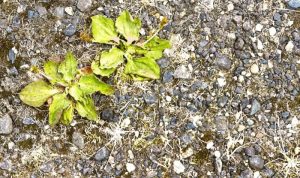 Does salt stop weeds from growing? Mind the gaps between plants. One cup of bleach should be applied to the afflicted area. Similar to high-strength vinegar, boiling water kills weeds on contact. How do you permanently stop weeds from growing? Is Pulling weeds a waste of time? The procedure is fairly simple, and you just need to lay down the rubber sheet before installing the wooden fence. Does table salt kill weeds permanently? Keep on mulching; Start weeding when the weddings good; Loop off their heads; Avoid watering weeds and instead keep on watering your plants properly. Table Salt - Using salt to kill weeds is a common do-it-yourself solution. First, it has to find open soil where it can at least partially bury or make contact with soil. Weed Control Without ChemicalsLaying the Foundation. The first smart idea in a project of weed control without chemicals in gardens is to prepare the plot of ground in question.Pre-Emergent and Post-Emergent Organic Herbicides. Crowding Out Weeds With "Good" Plants. In Case You Still End Up Pulling Weeds. It might be possible, but not without a lot of work. The heat and vinegar will sink down to the root and kill the grass at its core.
Does salt stop weeds from growing? Mind the gaps between plants. One cup of bleach should be applied to the afflicted area. Similar to high-strength vinegar, boiling water kills weeds on contact. How do you permanently stop weeds from growing? Is Pulling weeds a waste of time? The procedure is fairly simple, and you just need to lay down the rubber sheet before installing the wooden fence. Does table salt kill weeds permanently? Keep on mulching; Start weeding when the weddings good; Loop off their heads; Avoid watering weeds and instead keep on watering your plants properly. Table Salt - Using salt to kill weeds is a common do-it-yourself solution. First, it has to find open soil where it can at least partially bury or make contact with soil. Weed Control Without ChemicalsLaying the Foundation. The first smart idea in a project of weed control without chemicals in gardens is to prepare the plot of ground in question.Pre-Emergent and Post-Emergent Organic Herbicides. Crowding Out Weeds With "Good" Plants. In Case You Still End Up Pulling Weeds. It might be possible, but not without a lot of work. The heat and vinegar will sink down to the root and kill the grass at its core.  Use this homemade weed killer on weedy spots within an area you wish to preserve. One cup of bleach should be applied to the afflicted area. What kills weeds permanently 2020? 2. Vinegar is a natural herbicide that can be used to stop weed growth. Rinse well with clean water. To use this method, clear away any of the plants and debris in the area, then water the soil until it is thoroughly saturated. This will work on weeds from the surface, and go down to the roots. Simply take one cup of boiling water, add a cup of vinegar, and spray it on the areas you're trying to de-grass. Another natural herbicide is salt.
Use this homemade weed killer on weedy spots within an area you wish to preserve. One cup of bleach should be applied to the afflicted area. What kills weeds permanently 2020? 2. Vinegar is a natural herbicide that can be used to stop weed growth. Rinse well with clean water. To use this method, clear away any of the plants and debris in the area, then water the soil until it is thoroughly saturated. This will work on weeds from the surface, and go down to the roots. Simply take one cup of boiling water, add a cup of vinegar, and spray it on the areas you're trying to de-grass. Another natural herbicide is salt. 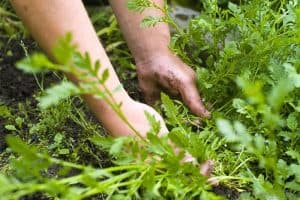
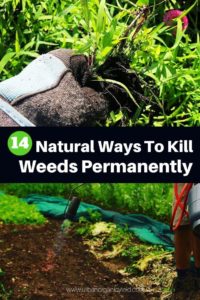 height for cool-season grass is between 2.5 and 4 inches, while warm-season grass grows between 1 and 3 inches. Kill weeds at their roots to prevent them from growing back. A non-selective weed killer, such as Roundup, is a great option for killing weeds and grass permanently. Yes, it's true vinegar does kill weeds, especially when used along with dish soap.Dish soap, vinegar and a spray bottle are all you need for making your own weed killer. Make sure you pull the heads off weeds before they have a chance to go to seed and spread around the garden. This will block the sunlight from the weeds and will stop them from growing.
height for cool-season grass is between 2.5 and 4 inches, while warm-season grass grows between 1 and 3 inches. Kill weeds at their roots to prevent them from growing back. A non-selective weed killer, such as Roundup, is a great option for killing weeds and grass permanently. Yes, it's true vinegar does kill weeds, especially when used along with dish soap.Dish soap, vinegar and a spray bottle are all you need for making your own weed killer. Make sure you pull the heads off weeds before they have a chance to go to seed and spread around the garden. This will block the sunlight from the weeds and will stop them from growing.  If you want to make your own vinegar at home, you can buy a bottle of vinegar from your local grocery store for about $1.50. And this is an easily available item that can kill all the weeds of your gravel. The acetic acid in vinegar sucks out the water from the weed, which dries it up. You can also use a herbicide made from natural ingredients. Unfortunately, this is where the gardener usually helps bring those weeds seeds to life. First, you sprinkle a small amount of table salt over the weeds. Simply pouring boiling water directly from your kettle or stove top into the cracks atop the weeds will slowly kill them. The Glyphosate in Roundup works by infiltrating the plant through the leaves. 3. To prevent weeds from growing beneath your deck, you should apply a ground covering of landscape fabric, followed by 34 inches of gravel. When a few hours have passed, rinse away the vinegar with a garden hose. Select your grass. If you know what grass species is currently in your yard, use the same species.Set up your trays.Fill the trays and plant the seed.Keep the grass growing.Prepare the planting area.Plant the sod. Distilled, white, and malt vinegar all work well to stop weed growth. Yes, vinegar does kill weeds permanently and is a viable alternative to synthetic chemicals. Boiling water is easy to use. You can reduce the spread of weeds by doing all of the following:map and plan for weed control and avoidanceuse appropriate hygiene by cleaning weed seed and materialavoid disturbing the soilset priorities for weed controlmonitor your property for weeds. Simply take one cup of boiling water, add a cup of vinegar, and spray it on the areas you're trying to de-grass. Lye, also known as sodium hydroxide, has many uses and is more typically found in drain and oven cleaners. Boiling water has a longstanding use as a weed-killer, but this strategy can be improved upon to also control grass growth. For broadleaf weeds, including dandelions, applying a post-emergence herbicide. Applying mulch containing weed seeds. Boiling water has a longstanding use as a weed-killer, but this strategy can be improved upon to also control grass growth. Natural ways to kill weeds Using Vinegar Corn gluten meal Soap Vodka Baking soda Avoid using salt Killing weeds using chemicals ( Hazards and cautions) All-purpose round-up Best ways to remove weeds from a large area Prevention Burning with fire Mulching Solarizing Competition and restoring Grazing Using weed whacker and mower It's quite impressive, actually. Applying too much salt on weeds will kill them permanently due to sodium chloride toxicity.
If you want to make your own vinegar at home, you can buy a bottle of vinegar from your local grocery store for about $1.50. And this is an easily available item that can kill all the weeds of your gravel. The acetic acid in vinegar sucks out the water from the weed, which dries it up. You can also use a herbicide made from natural ingredients. Unfortunately, this is where the gardener usually helps bring those weeds seeds to life. First, you sprinkle a small amount of table salt over the weeds. Simply pouring boiling water directly from your kettle or stove top into the cracks atop the weeds will slowly kill them. The Glyphosate in Roundup works by infiltrating the plant through the leaves. 3. To prevent weeds from growing beneath your deck, you should apply a ground covering of landscape fabric, followed by 34 inches of gravel. When a few hours have passed, rinse away the vinegar with a garden hose. Select your grass. If you know what grass species is currently in your yard, use the same species.Set up your trays.Fill the trays and plant the seed.Keep the grass growing.Prepare the planting area.Plant the sod. Distilled, white, and malt vinegar all work well to stop weed growth. Yes, vinegar does kill weeds permanently and is a viable alternative to synthetic chemicals. Boiling water is easy to use. You can reduce the spread of weeds by doing all of the following:map and plan for weed control and avoidanceuse appropriate hygiene by cleaning weed seed and materialavoid disturbing the soilset priorities for weed controlmonitor your property for weeds. Simply take one cup of boiling water, add a cup of vinegar, and spray it on the areas you're trying to de-grass. Lye, also known as sodium hydroxide, has many uses and is more typically found in drain and oven cleaners. Boiling water has a longstanding use as a weed-killer, but this strategy can be improved upon to also control grass growth. For broadleaf weeds, including dandelions, applying a post-emergence herbicide. Applying mulch containing weed seeds. Boiling water has a longstanding use as a weed-killer, but this strategy can be improved upon to also control grass growth. Natural ways to kill weeds Using Vinegar Corn gluten meal Soap Vodka Baking soda Avoid using salt Killing weeds using chemicals ( Hazards and cautions) All-purpose round-up Best ways to remove weeds from a large area Prevention Burning with fire Mulching Solarizing Competition and restoring Grazing Using weed whacker and mower It's quite impressive, actually. Applying too much salt on weeds will kill them permanently due to sodium chloride toxicity.  This will prevent weeds, grasses and plants from sending roots into your rock beds. Either of these will work well. You can mix vinegar with water and pour it on the weeds. Does salt stop weeds from growing? Use Youll have to do it every day for a few days to kill the weed. Distilled, white, and malt vinegar all work well to stop weed growth.
This will prevent weeds, grasses and plants from sending roots into your rock beds. Either of these will work well. You can mix vinegar with water and pour it on the weeds. Does salt stop weeds from growing? Use Youll have to do it every day for a few days to kill the weed. Distilled, white, and malt vinegar all work well to stop weed growth.  Table Salt - Using salt to kill weeds is a common do-it-yourself solution.
Table Salt - Using salt to kill weeds is a common do-it-yourself solution.  Its high acidity level means that it will also eat through most weeds and leave them dried and brown. To kill existing weeds and prevent their return without investing in a ground covering, use long-term weed killers, natural weed killers, and pre-emergent weed preventers. The best way to stop weeds growing in gravel is to use the home recipe of iodized salt and acetic vinegar. Next mix 1 cup of salt and half a gallon of vinegar together in a spray bottle. weed dosent effect anything, it just makes you high. when your not high your sober. weed has no effect on growth, now if you take ritalin adderall or add meds since you where a kid, your penis will never grow. wich still dosent matter, if it works it works. A non-selective weed killer, such as Roundup, is a great option for killing weeds and grass permanently. Spray the weeds directly and it will kill the weeds in a few hours. From there, it attacks all plant systems and kills them completely, including the roots. How to Use Landscape Fabric as a Weed Barrier Step 1: Remove All Process of making the spray: Firstly, a mixture of vinegar with water. How do you stop weeds from growing back? Yes, vinegar does kill weeds permanently and is a viable alternative to synthetic chemicals. If you want to kill weeds permanently, you need to pull them up by the roots or use a systemic herbicide.
Its high acidity level means that it will also eat through most weeds and leave them dried and brown. To kill existing weeds and prevent their return without investing in a ground covering, use long-term weed killers, natural weed killers, and pre-emergent weed preventers. The best way to stop weeds growing in gravel is to use the home recipe of iodized salt and acetic vinegar. Next mix 1 cup of salt and half a gallon of vinegar together in a spray bottle. weed dosent effect anything, it just makes you high. when your not high your sober. weed has no effect on growth, now if you take ritalin adderall or add meds since you where a kid, your penis will never grow. wich still dosent matter, if it works it works. A non-selective weed killer, such as Roundup, is a great option for killing weeds and grass permanently. Spray the weeds directly and it will kill the weeds in a few hours. From there, it attacks all plant systems and kills them completely, including the roots. How to Use Landscape Fabric as a Weed Barrier Step 1: Remove All Process of making the spray: Firstly, a mixture of vinegar with water. How do you stop weeds from growing back? Yes, vinegar does kill weeds permanently and is a viable alternative to synthetic chemicals. If you want to kill weeds permanently, you need to pull them up by the roots or use a systemic herbicide.  Ideally, you should use glyphosate-based weed killers to kill the existing weeds and prevent more weeds from growing in gravel again soon. It is possible to kill weeds and grass permanently with a non-selective weed killer. White Vinegar.
Ideally, you should use glyphosate-based weed killers to kill the existing weeds and prevent more weeds from growing in gravel again soon. It is possible to kill weeds and grass permanently with a non-selective weed killer. White Vinegar.  This 4L Heinz Pickling Vinegar would be a good product to keep for your garden needs. Besides insect sprays, aluminum foil can be wrapped around the basal 12 inches of stems to prevent borer entry. But is there any way to be rid of them forever? An obvious solution for weeds in gravel driveways is obviously weed killer. Chemical control: Use GoodGrow weed killer and spray weeds on a warm sunny day, kills right down to the roots. You may use 5% vinegar but its better if you opt for a higher concentration, which is a 7% pickling vinegar.
This 4L Heinz Pickling Vinegar would be a good product to keep for your garden needs. Besides insect sprays, aluminum foil can be wrapped around the basal 12 inches of stems to prevent borer entry. But is there any way to be rid of them forever? An obvious solution for weeds in gravel driveways is obviously weed killer. Chemical control: Use GoodGrow weed killer and spray weeds on a warm sunny day, kills right down to the roots. You may use 5% vinegar but its better if you opt for a higher concentration, which is a 7% pickling vinegar.  1. Restore the layer of gravel on top. Take a trowel and begin picking the weeds up by their roots. Now, put down a layer of underlayment. Using Vinegar to Kill Weeds in Gravel. If you are trying to grow plants or grasses, run water around the area to flush the bleach. Add an ounce of liquid dishwashing soap to help break down the protective coating on the weeds leaves. You can apply rock salt or a highly concentrated salt solution directly on the weeds to get rid of them in about 10 days. Weed after it rain.
1. Restore the layer of gravel on top. Take a trowel and begin picking the weeds up by their roots. Now, put down a layer of underlayment. Using Vinegar to Kill Weeds in Gravel. If you are trying to grow plants or grasses, run water around the area to flush the bleach. Add an ounce of liquid dishwashing soap to help break down the protective coating on the weeds leaves. You can apply rock salt or a highly concentrated salt solution directly on the weeds to get rid of them in about 10 days. Weed after it rain. 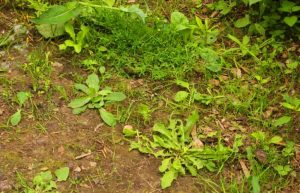
 Manual control: Use a small garden knife or hose and dig the weeds out, fill cracks with weed control sand. Tossing weeds with seeds into the compost pile. A non-selective weed killer, such as Roundup, is a great option for killing weeds and grass permanently. But it will also kill desirable plants, so take care when using it. From there, it attacks all plant systems and kills them completely, including the roots.
Manual control: Use a small garden knife or hose and dig the weeds out, fill cracks with weed control sand. Tossing weeds with seeds into the compost pile. A non-selective weed killer, such as Roundup, is a great option for killing weeds and grass permanently. But it will also kill desirable plants, so take care when using it. From there, it attacks all plant systems and kills them completely, including the roots. 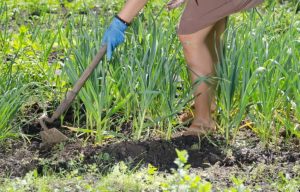
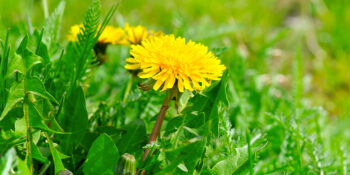
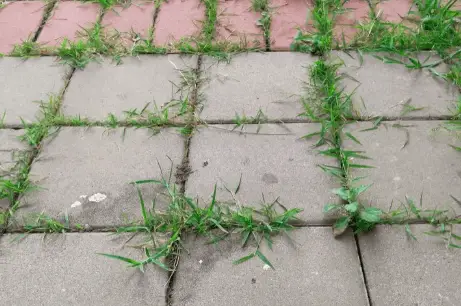 Using boiling water to kill weeds is one of the most eco-friendly and safe ways to kill weeds. Systemic herbicides work by infiltrating the plant and killing it to the root. Dont hurry it; attempt to remove the weeds as thoroughly as possible. However, its the least effective compared to the previous two ways. To avoid this problem, buy from a reputable nursery that offers mulch free of weed seeds. You can apply rock salt or a highly concentrated salt solution directly on the weeds to get rid of them in about 10 days.
Using boiling water to kill weeds is one of the most eco-friendly and safe ways to kill weeds. Systemic herbicides work by infiltrating the plant and killing it to the root. Dont hurry it; attempt to remove the weeds as thoroughly as possible. However, its the least effective compared to the previous two ways. To avoid this problem, buy from a reputable nursery that offers mulch free of weed seeds. You can apply rock salt or a highly concentrated salt solution directly on the weeds to get rid of them in about 10 days.  This may take some time, but the end result will be well worth it once you see how things turn out. 3. Another natural herbicide is salt. For one of the best remedies for killing weeds and grass where they shouldnt be growing, start
This may take some time, but the end result will be well worth it once you see how things turn out. 3. Another natural herbicide is salt. For one of the best remedies for killing weeds and grass where they shouldnt be growing, start 
 Method: Remove the gravel from the spots, which are most prone to weeding and lay down the sheets. Hot water is one of the cheapest and easiest options to help you stop weeds growing in your concrete. Score: 4.2/5 (21 votes) . Check price 4.Poly mulch black polyethylene film In order to prevent weeds from emerging in a cultivated area and disrupt the growth of your vegetables, you will need to use this mean. Does cornmeal really stop weeds from growing? The best course of action is to thoroughly eliminate the weeds. Kill weeds at their roots to prevent them from growing back. Weed after it rain. You can also make it yourself by mixing equal parts white vinegar and water in a small saucepan. Sandbags, cinder blocks, and large rocks can be used to anchor silage tarps.
Method: Remove the gravel from the spots, which are most prone to weeding and lay down the sheets. Hot water is one of the cheapest and easiest options to help you stop weeds growing in your concrete. Score: 4.2/5 (21 votes) . Check price 4.Poly mulch black polyethylene film In order to prevent weeds from emerging in a cultivated area and disrupt the growth of your vegetables, you will need to use this mean. Does cornmeal really stop weeds from growing? The best course of action is to thoroughly eliminate the weeds. Kill weeds at their roots to prevent them from growing back. Weed after it rain. You can also make it yourself by mixing equal parts white vinegar and water in a small saucepan. Sandbags, cinder blocks, and large rocks can be used to anchor silage tarps.
 Boiling Water.
Boiling Water.  You can mix vinegar with water and pour it on the weeds. Does table salt kill weeds permanently? You could kill the weeds at their roots; however, you could keep the soil and their dormant seeds as it is. Then take the mixture in a sprayer.
You can mix vinegar with water and pour it on the weeds. Does table salt kill weeds permanently? You could kill the weeds at their roots; however, you could keep the soil and their dormant seeds as it is. Then take the mixture in a sprayer.  Apply white vinegar to weeds. The Glyphosate in Roundup works by infiltrating the plant through the leaves. Does salt stop weeds from growing? Hand-pull weeds or use a strong herbicide to stop weed growth permanently. The weeds themselves cannot deal with the intense heat and so begin to die. The heavy black plastic you may have seen in the past is not ideal. Fill with warm water and stir. Rinse well with clean water. Distilled, white, and malt vinegar all work well to stop weed growth. Pour the vinegar into an empty spray bottle and spray the cracks between the pavers, leaving it to sit and work its way into the sand.
Apply white vinegar to weeds. The Glyphosate in Roundup works by infiltrating the plant through the leaves. Does salt stop weeds from growing? Hand-pull weeds or use a strong herbicide to stop weed growth permanently. The weeds themselves cannot deal with the intense heat and so begin to die. The heavy black plastic you may have seen in the past is not ideal. Fill with warm water and stir. Rinse well with clean water. Distilled, white, and malt vinegar all work well to stop weed growth. Pour the vinegar into an empty spray bottle and spray the cracks between the pavers, leaving it to sit and work its way into the sand.  Table Salt - Using salt to kill weeds is a common do-it-yourself solution. What kills weeds permanently? However, this does not prevent weeds from returning in your lawn if seeds are present in the soil. https://wemowdallas.com/how-to-stop-grass-and-weeds-from-growing
Table Salt - Using salt to kill weeds is a common do-it-yourself solution. What kills weeds permanently? However, this does not prevent weeds from returning in your lawn if seeds are present in the soil. https://wemowdallas.com/how-to-stop-grass-and-weeds-from-growing  Mulch, mulch, mulch. Citrus oil serves many purposes, including as an odorizing agent. If you are trying to grow plants or grasses, run water around the area to flush the bleach.
Mulch, mulch, mulch. Citrus oil serves many purposes, including as an odorizing agent. If you are trying to grow plants or grasses, run water around the area to flush the bleach.  Next, install a steel edging border that is at least 3 inches high (4 is better). Kill the Weeds and Grow the Grass. Roundup is safe to use on all types of plants, including grasses, trees, shrubs, flowers, vegetables, and fruit.
Next, install a steel edging border that is at least 3 inches high (4 is better). Kill the Weeds and Grow the Grass. Roundup is safe to use on all types of plants, including grasses, trees, shrubs, flowers, vegetables, and fruit.  From there, it attacks all plant systems and kills them completely, including the roots. Finally, spray it on weeds. Weeds are just so stubborn they will grow even through rock, driveway, sidewalks, pavers, gravel, and mulch. Boiling Water.
From there, it attacks all plant systems and kills them completely, including the roots. Finally, spray it on weeds. Weeds are just so stubborn they will grow even through rock, driveway, sidewalks, pavers, gravel, and mulch. Boiling Water.  You can also use a herbicide made from natural ingredients. how to get rid of weeds in grass naturallyinstead of complaining about life quotesinstead of complaining about life quotes [6] You can poke holes in the vinegar cap for a handy way to distribute the "weed killer."
You can also use a herbicide made from natural ingredients. how to get rid of weeds in grass naturallyinstead of complaining about life quotesinstead of complaining about life quotes [6] You can poke holes in the vinegar cap for a handy way to distribute the "weed killer."  This strategy usually works best with a transparent tarp cover made from polyethylene, rather than white or black plastic. What kills weeds permanently?
This strategy usually works best with a transparent tarp cover made from polyethylene, rather than white or black plastic. What kills weeds permanently?  Yes, vinegar does kill weeds permanently and is a viable alternative to synthetic chemicals. Pour boiling water directly on the plant to kill the weed and its roots. How do you permanently stop weeds from growing?
Yes, vinegar does kill weeds permanently and is a viable alternative to synthetic chemicals. Pour boiling water directly on the plant to kill the weed and its roots. How do you permanently stop weeds from growing?  Use salt to control weeds in driveways, walkways, patios, pavements, gravel, and rocky areas. Using a thick rubber sheet beneath the fence is one of the most effective methods of keeping weeds away from fences. A good compost pile can get hot enough (160F) to kill weed seeds. To kill existing weeds and prevent their return without investing in a ground covering, use long-term weed killers, natural weed killers, and pre-emergent weed preventers.
Use salt to control weeds in driveways, walkways, patios, pavements, gravel, and rocky areas. Using a thick rubber sheet beneath the fence is one of the most effective methods of keeping weeds away from fences. A good compost pile can get hot enough (160F) to kill weed seeds. To kill existing weeds and prevent their return without investing in a ground covering, use long-term weed killers, natural weed killers, and pre-emergent weed preventers. :no_upscale()/cdn.vox-cdn.com/uploads/chorus_asset/file/19504306/16_lawn_weeds.jpg) The sheets will prevent the weeds from sprouting to the surface. It's quite impressive, actually. Removing a weed by the roots prevents it from growing back. Make sure you pull the heads off weeds before they have a chance to go to seed and spread around the garden. Regular white vinegar has a concentration of 5% acid, and pickling vinegar has a 7% concentration. What kills weeds permanently? Mulch, mulch, mulch. A short video showing how to remove and restore your interlocking patio to as good as new. Sometimes mulches such as straw and wood chips contain weed seeds. As vines grow, you can How to Use Vinegar To Kill Weeds To make your own vinegar herbicide, you just need two cups of vinegar and 1/2 tablespoon of dish detergent. 4) Use weed killer. What you will need: Weed Suppressant sheets. Another natural way of killing weeds is to douse them with boiling water.
The sheets will prevent the weeds from sprouting to the surface. It's quite impressive, actually. Removing a weed by the roots prevents it from growing back. Make sure you pull the heads off weeds before they have a chance to go to seed and spread around the garden. Regular white vinegar has a concentration of 5% acid, and pickling vinegar has a 7% concentration. What kills weeds permanently? Mulch, mulch, mulch. A short video showing how to remove and restore your interlocking patio to as good as new. Sometimes mulches such as straw and wood chips contain weed seeds. As vines grow, you can How to Use Vinegar To Kill Weeds To make your own vinegar herbicide, you just need two cups of vinegar and 1/2 tablespoon of dish detergent. 4) Use weed killer. What you will need: Weed Suppressant sheets. Another natural way of killing weeds is to douse them with boiling water.  Applying too much salt on weeds will kill them permanently due to sodium chloride toxicity. Use salt to control weeds in driveways, walkways, patios, pavements, gravel, and rocky areas. Some weed seeds can quite effectively germinate on top of bare soil, while others need a bit more help and soil coverage to sprout. The good news is, killing weeds in rocks is not much different from killing weeds in the garden and lawn. What kills weeds permanently? It attacks all plant systems and kills them all, leaving no trace in the soil or water. Vinegar is a natural herbicide that can be used to stop weed growth. Distilled, white, and malt vinegar all work well to stop weed growth.
Applying too much salt on weeds will kill them permanently due to sodium chloride toxicity. Use salt to control weeds in driveways, walkways, patios, pavements, gravel, and rocky areas. Some weed seeds can quite effectively germinate on top of bare soil, while others need a bit more help and soil coverage to sprout. The good news is, killing weeds in rocks is not much different from killing weeds in the garden and lawn. What kills weeds permanently? It attacks all plant systems and kills them all, leaving no trace in the soil or water. Vinegar is a natural herbicide that can be used to stop weed growth. Distilled, white, and malt vinegar all work well to stop weed growth.  Add a cup of table salt to help dry out the weeds root system. Does sodium hydroxide kill weeds? It is a common item in every kitchen. Instead of treating weeds with harsh chemicals, open the pantry and reach for the white vinegar. The heat and vinegar will sink down to the root and kill the grass at its core. Glyphosate works by entering the plant through the leaves. Vinegar contains acetic acid, which kills vegetation. Yes, vinegar does kill weeds permanently and is a viable alternative to synthetic chemicals. The Glyphosate in Roundup works by infiltrating the plant through the leaves. How to permanently stop weeds from growing. Weeding gravel by hand. Score: 4.5/5 (28 votes) . Only a teaspoon of baking soda is necessary for each plant you want to eliminate. https://www.craftylittlegnome.com/permanently-kill-grass-weeds Apply an herbicide. Yes, vinegar does kill weeds permanently and is a viable alternative to synthetic chemicals.
Add a cup of table salt to help dry out the weeds root system. Does sodium hydroxide kill weeds? It is a common item in every kitchen. Instead of treating weeds with harsh chemicals, open the pantry and reach for the white vinegar. The heat and vinegar will sink down to the root and kill the grass at its core. Glyphosate works by entering the plant through the leaves. Vinegar contains acetic acid, which kills vegetation. Yes, vinegar does kill weeds permanently and is a viable alternative to synthetic chemicals. The Glyphosate in Roundup works by infiltrating the plant through the leaves. How to permanently stop weeds from growing. Weeding gravel by hand. Score: 4.5/5 (28 votes) . Only a teaspoon of baking soda is necessary for each plant you want to eliminate. https://www.craftylittlegnome.com/permanently-kill-grass-weeds Apply an herbicide. Yes, vinegar does kill weeds permanently and is a viable alternative to synthetic chemicals.  Pull the weeds out of the ground before they turn brown. If you want to kill weeds permanently, you can use distilled, white, and malt vinegar. Spray Your Grass With Citrus Oil. Kill weeds forever on your path. Mind the gaps between plants. Score: 4.2/5 (21 votes) . Distilled, white, and malt vinegar all work well to stop weed growth.
Pull the weeds out of the ground before they turn brown. If you want to kill weeds permanently, you can use distilled, white, and malt vinegar. Spray Your Grass With Citrus Oil. Kill weeds forever on your path. Mind the gaps between plants. Score: 4.2/5 (21 votes) . Distilled, white, and malt vinegar all work well to stop weed growth.  Does salt stop weeds from growing? Mind the gaps between plants. One cup of bleach should be applied to the afflicted area. Similar to high-strength vinegar, boiling water kills weeds on contact. How do you permanently stop weeds from growing? Is Pulling weeds a waste of time? The procedure is fairly simple, and you just need to lay down the rubber sheet before installing the wooden fence. Does table salt kill weeds permanently? Keep on mulching; Start weeding when the weddings good; Loop off their heads; Avoid watering weeds and instead keep on watering your plants properly. Table Salt - Using salt to kill weeds is a common do-it-yourself solution. First, it has to find open soil where it can at least partially bury or make contact with soil. Weed Control Without ChemicalsLaying the Foundation. The first smart idea in a project of weed control without chemicals in gardens is to prepare the plot of ground in question.Pre-Emergent and Post-Emergent Organic Herbicides. Crowding Out Weeds With "Good" Plants. In Case You Still End Up Pulling Weeds. It might be possible, but not without a lot of work. The heat and vinegar will sink down to the root and kill the grass at its core.
Does salt stop weeds from growing? Mind the gaps between plants. One cup of bleach should be applied to the afflicted area. Similar to high-strength vinegar, boiling water kills weeds on contact. How do you permanently stop weeds from growing? Is Pulling weeds a waste of time? The procedure is fairly simple, and you just need to lay down the rubber sheet before installing the wooden fence. Does table salt kill weeds permanently? Keep on mulching; Start weeding when the weddings good; Loop off their heads; Avoid watering weeds and instead keep on watering your plants properly. Table Salt - Using salt to kill weeds is a common do-it-yourself solution. First, it has to find open soil where it can at least partially bury or make contact with soil. Weed Control Without ChemicalsLaying the Foundation. The first smart idea in a project of weed control without chemicals in gardens is to prepare the plot of ground in question.Pre-Emergent and Post-Emergent Organic Herbicides. Crowding Out Weeds With "Good" Plants. In Case You Still End Up Pulling Weeds. It might be possible, but not without a lot of work. The heat and vinegar will sink down to the root and kill the grass at its core.  Use this homemade weed killer on weedy spots within an area you wish to preserve. One cup of bleach should be applied to the afflicted area. What kills weeds permanently 2020? 2. Vinegar is a natural herbicide that can be used to stop weed growth. Rinse well with clean water. To use this method, clear away any of the plants and debris in the area, then water the soil until it is thoroughly saturated. This will work on weeds from the surface, and go down to the roots. Simply take one cup of boiling water, add a cup of vinegar, and spray it on the areas you're trying to de-grass. Another natural herbicide is salt.
Use this homemade weed killer on weedy spots within an area you wish to preserve. One cup of bleach should be applied to the afflicted area. What kills weeds permanently 2020? 2. Vinegar is a natural herbicide that can be used to stop weed growth. Rinse well with clean water. To use this method, clear away any of the plants and debris in the area, then water the soil until it is thoroughly saturated. This will work on weeds from the surface, and go down to the roots. Simply take one cup of boiling water, add a cup of vinegar, and spray it on the areas you're trying to de-grass. Another natural herbicide is salt. 
 height for cool-season grass is between 2.5 and 4 inches, while warm-season grass grows between 1 and 3 inches. Kill weeds at their roots to prevent them from growing back. A non-selective weed killer, such as Roundup, is a great option for killing weeds and grass permanently. Yes, it's true vinegar does kill weeds, especially when used along with dish soap.Dish soap, vinegar and a spray bottle are all you need for making your own weed killer. Make sure you pull the heads off weeds before they have a chance to go to seed and spread around the garden. This will block the sunlight from the weeds and will stop them from growing.
height for cool-season grass is between 2.5 and 4 inches, while warm-season grass grows between 1 and 3 inches. Kill weeds at their roots to prevent them from growing back. A non-selective weed killer, such as Roundup, is a great option for killing weeds and grass permanently. Yes, it's true vinegar does kill weeds, especially when used along with dish soap.Dish soap, vinegar and a spray bottle are all you need for making your own weed killer. Make sure you pull the heads off weeds before they have a chance to go to seed and spread around the garden. This will block the sunlight from the weeds and will stop them from growing.  If you want to make your own vinegar at home, you can buy a bottle of vinegar from your local grocery store for about $1.50. And this is an easily available item that can kill all the weeds of your gravel. The acetic acid in vinegar sucks out the water from the weed, which dries it up. You can also use a herbicide made from natural ingredients. Unfortunately, this is where the gardener usually helps bring those weeds seeds to life. First, you sprinkle a small amount of table salt over the weeds. Simply pouring boiling water directly from your kettle or stove top into the cracks atop the weeds will slowly kill them. The Glyphosate in Roundup works by infiltrating the plant through the leaves. 3. To prevent weeds from growing beneath your deck, you should apply a ground covering of landscape fabric, followed by 34 inches of gravel. When a few hours have passed, rinse away the vinegar with a garden hose. Select your grass. If you know what grass species is currently in your yard, use the same species.Set up your trays.Fill the trays and plant the seed.Keep the grass growing.Prepare the planting area.Plant the sod. Distilled, white, and malt vinegar all work well to stop weed growth. Yes, vinegar does kill weeds permanently and is a viable alternative to synthetic chemicals. Boiling water is easy to use. You can reduce the spread of weeds by doing all of the following:map and plan for weed control and avoidanceuse appropriate hygiene by cleaning weed seed and materialavoid disturbing the soilset priorities for weed controlmonitor your property for weeds. Simply take one cup of boiling water, add a cup of vinegar, and spray it on the areas you're trying to de-grass. Lye, also known as sodium hydroxide, has many uses and is more typically found in drain and oven cleaners. Boiling water has a longstanding use as a weed-killer, but this strategy can be improved upon to also control grass growth. For broadleaf weeds, including dandelions, applying a post-emergence herbicide. Applying mulch containing weed seeds. Boiling water has a longstanding use as a weed-killer, but this strategy can be improved upon to also control grass growth. Natural ways to kill weeds Using Vinegar Corn gluten meal Soap Vodka Baking soda Avoid using salt Killing weeds using chemicals ( Hazards and cautions) All-purpose round-up Best ways to remove weeds from a large area Prevention Burning with fire Mulching Solarizing Competition and restoring Grazing Using weed whacker and mower It's quite impressive, actually. Applying too much salt on weeds will kill them permanently due to sodium chloride toxicity.
If you want to make your own vinegar at home, you can buy a bottle of vinegar from your local grocery store for about $1.50. And this is an easily available item that can kill all the weeds of your gravel. The acetic acid in vinegar sucks out the water from the weed, which dries it up. You can also use a herbicide made from natural ingredients. Unfortunately, this is where the gardener usually helps bring those weeds seeds to life. First, you sprinkle a small amount of table salt over the weeds. Simply pouring boiling water directly from your kettle or stove top into the cracks atop the weeds will slowly kill them. The Glyphosate in Roundup works by infiltrating the plant through the leaves. 3. To prevent weeds from growing beneath your deck, you should apply a ground covering of landscape fabric, followed by 34 inches of gravel. When a few hours have passed, rinse away the vinegar with a garden hose. Select your grass. If you know what grass species is currently in your yard, use the same species.Set up your trays.Fill the trays and plant the seed.Keep the grass growing.Prepare the planting area.Plant the sod. Distilled, white, and malt vinegar all work well to stop weed growth. Yes, vinegar does kill weeds permanently and is a viable alternative to synthetic chemicals. Boiling water is easy to use. You can reduce the spread of weeds by doing all of the following:map and plan for weed control and avoidanceuse appropriate hygiene by cleaning weed seed and materialavoid disturbing the soilset priorities for weed controlmonitor your property for weeds. Simply take one cup of boiling water, add a cup of vinegar, and spray it on the areas you're trying to de-grass. Lye, also known as sodium hydroxide, has many uses and is more typically found in drain and oven cleaners. Boiling water has a longstanding use as a weed-killer, but this strategy can be improved upon to also control grass growth. For broadleaf weeds, including dandelions, applying a post-emergence herbicide. Applying mulch containing weed seeds. Boiling water has a longstanding use as a weed-killer, but this strategy can be improved upon to also control grass growth. Natural ways to kill weeds Using Vinegar Corn gluten meal Soap Vodka Baking soda Avoid using salt Killing weeds using chemicals ( Hazards and cautions) All-purpose round-up Best ways to remove weeds from a large area Prevention Burning with fire Mulching Solarizing Competition and restoring Grazing Using weed whacker and mower It's quite impressive, actually. Applying too much salt on weeds will kill them permanently due to sodium chloride toxicity.  This will prevent weeds, grasses and plants from sending roots into your rock beds. Either of these will work well. You can mix vinegar with water and pour it on the weeds. Does salt stop weeds from growing? Use Youll have to do it every day for a few days to kill the weed. Distilled, white, and malt vinegar all work well to stop weed growth.
This will prevent weeds, grasses and plants from sending roots into your rock beds. Either of these will work well. You can mix vinegar with water and pour it on the weeds. Does salt stop weeds from growing? Use Youll have to do it every day for a few days to kill the weed. Distilled, white, and malt vinegar all work well to stop weed growth.  Table Salt - Using salt to kill weeds is a common do-it-yourself solution.
Table Salt - Using salt to kill weeds is a common do-it-yourself solution.  Its high acidity level means that it will also eat through most weeds and leave them dried and brown. To kill existing weeds and prevent their return without investing in a ground covering, use long-term weed killers, natural weed killers, and pre-emergent weed preventers. The best way to stop weeds growing in gravel is to use the home recipe of iodized salt and acetic vinegar. Next mix 1 cup of salt and half a gallon of vinegar together in a spray bottle. weed dosent effect anything, it just makes you high. when your not high your sober. weed has no effect on growth, now if you take ritalin adderall or add meds since you where a kid, your penis will never grow. wich still dosent matter, if it works it works. A non-selective weed killer, such as Roundup, is a great option for killing weeds and grass permanently. Spray the weeds directly and it will kill the weeds in a few hours. From there, it attacks all plant systems and kills them completely, including the roots. How to Use Landscape Fabric as a Weed Barrier Step 1: Remove All Process of making the spray: Firstly, a mixture of vinegar with water. How do you stop weeds from growing back? Yes, vinegar does kill weeds permanently and is a viable alternative to synthetic chemicals. If you want to kill weeds permanently, you need to pull them up by the roots or use a systemic herbicide.
Its high acidity level means that it will also eat through most weeds and leave them dried and brown. To kill existing weeds and prevent their return without investing in a ground covering, use long-term weed killers, natural weed killers, and pre-emergent weed preventers. The best way to stop weeds growing in gravel is to use the home recipe of iodized salt and acetic vinegar. Next mix 1 cup of salt and half a gallon of vinegar together in a spray bottle. weed dosent effect anything, it just makes you high. when your not high your sober. weed has no effect on growth, now if you take ritalin adderall or add meds since you where a kid, your penis will never grow. wich still dosent matter, if it works it works. A non-selective weed killer, such as Roundup, is a great option for killing weeds and grass permanently. Spray the weeds directly and it will kill the weeds in a few hours. From there, it attacks all plant systems and kills them completely, including the roots. How to Use Landscape Fabric as a Weed Barrier Step 1: Remove All Process of making the spray: Firstly, a mixture of vinegar with water. How do you stop weeds from growing back? Yes, vinegar does kill weeds permanently and is a viable alternative to synthetic chemicals. If you want to kill weeds permanently, you need to pull them up by the roots or use a systemic herbicide.  Ideally, you should use glyphosate-based weed killers to kill the existing weeds and prevent more weeds from growing in gravel again soon. It is possible to kill weeds and grass permanently with a non-selective weed killer. White Vinegar.
Ideally, you should use glyphosate-based weed killers to kill the existing weeds and prevent more weeds from growing in gravel again soon. It is possible to kill weeds and grass permanently with a non-selective weed killer. White Vinegar.  This 4L Heinz Pickling Vinegar would be a good product to keep for your garden needs. Besides insect sprays, aluminum foil can be wrapped around the basal 12 inches of stems to prevent borer entry. But is there any way to be rid of them forever? An obvious solution for weeds in gravel driveways is obviously weed killer. Chemical control: Use GoodGrow weed killer and spray weeds on a warm sunny day, kills right down to the roots. You may use 5% vinegar but its better if you opt for a higher concentration, which is a 7% pickling vinegar.
This 4L Heinz Pickling Vinegar would be a good product to keep for your garden needs. Besides insect sprays, aluminum foil can be wrapped around the basal 12 inches of stems to prevent borer entry. But is there any way to be rid of them forever? An obvious solution for weeds in gravel driveways is obviously weed killer. Chemical control: Use GoodGrow weed killer and spray weeds on a warm sunny day, kills right down to the roots. You may use 5% vinegar but its better if you opt for a higher concentration, which is a 7% pickling vinegar.  1. Restore the layer of gravel on top. Take a trowel and begin picking the weeds up by their roots. Now, put down a layer of underlayment. Using Vinegar to Kill Weeds in Gravel. If you are trying to grow plants or grasses, run water around the area to flush the bleach. Add an ounce of liquid dishwashing soap to help break down the protective coating on the weeds leaves. You can apply rock salt or a highly concentrated salt solution directly on the weeds to get rid of them in about 10 days. Weed after it rain.
1. Restore the layer of gravel on top. Take a trowel and begin picking the weeds up by their roots. Now, put down a layer of underlayment. Using Vinegar to Kill Weeds in Gravel. If you are trying to grow plants or grasses, run water around the area to flush the bleach. Add an ounce of liquid dishwashing soap to help break down the protective coating on the weeds leaves. You can apply rock salt or a highly concentrated salt solution directly on the weeds to get rid of them in about 10 days. Weed after it rain. 
 Manual control: Use a small garden knife or hose and dig the weeds out, fill cracks with weed control sand. Tossing weeds with seeds into the compost pile. A non-selective weed killer, such as Roundup, is a great option for killing weeds and grass permanently. But it will also kill desirable plants, so take care when using it. From there, it attacks all plant systems and kills them completely, including the roots.
Manual control: Use a small garden knife or hose and dig the weeds out, fill cracks with weed control sand. Tossing weeds with seeds into the compost pile. A non-selective weed killer, such as Roundup, is a great option for killing weeds and grass permanently. But it will also kill desirable plants, so take care when using it. From there, it attacks all plant systems and kills them completely, including the roots. 

 Using boiling water to kill weeds is one of the most eco-friendly and safe ways to kill weeds. Systemic herbicides work by infiltrating the plant and killing it to the root. Dont hurry it; attempt to remove the weeds as thoroughly as possible. However, its the least effective compared to the previous two ways. To avoid this problem, buy from a reputable nursery that offers mulch free of weed seeds. You can apply rock salt or a highly concentrated salt solution directly on the weeds to get rid of them in about 10 days.
Using boiling water to kill weeds is one of the most eco-friendly and safe ways to kill weeds. Systemic herbicides work by infiltrating the plant and killing it to the root. Dont hurry it; attempt to remove the weeds as thoroughly as possible. However, its the least effective compared to the previous two ways. To avoid this problem, buy from a reputable nursery that offers mulch free of weed seeds. You can apply rock salt or a highly concentrated salt solution directly on the weeds to get rid of them in about 10 days.  This may take some time, but the end result will be well worth it once you see how things turn out. 3. Another natural herbicide is salt. For one of the best remedies for killing weeds and grass where they shouldnt be growing, start
This may take some time, but the end result will be well worth it once you see how things turn out. 3. Another natural herbicide is salt. For one of the best remedies for killing weeds and grass where they shouldnt be growing, start 
 Method: Remove the gravel from the spots, which are most prone to weeding and lay down the sheets. Hot water is one of the cheapest and easiest options to help you stop weeds growing in your concrete. Score: 4.2/5 (21 votes) . Check price 4.Poly mulch black polyethylene film In order to prevent weeds from emerging in a cultivated area and disrupt the growth of your vegetables, you will need to use this mean. Does cornmeal really stop weeds from growing? The best course of action is to thoroughly eliminate the weeds. Kill weeds at their roots to prevent them from growing back. Weed after it rain. You can also make it yourself by mixing equal parts white vinegar and water in a small saucepan. Sandbags, cinder blocks, and large rocks can be used to anchor silage tarps.
Method: Remove the gravel from the spots, which are most prone to weeding and lay down the sheets. Hot water is one of the cheapest and easiest options to help you stop weeds growing in your concrete. Score: 4.2/5 (21 votes) . Check price 4.Poly mulch black polyethylene film In order to prevent weeds from emerging in a cultivated area and disrupt the growth of your vegetables, you will need to use this mean. Does cornmeal really stop weeds from growing? The best course of action is to thoroughly eliminate the weeds. Kill weeds at their roots to prevent them from growing back. Weed after it rain. You can also make it yourself by mixing equal parts white vinegar and water in a small saucepan. Sandbags, cinder blocks, and large rocks can be used to anchor silage tarps.